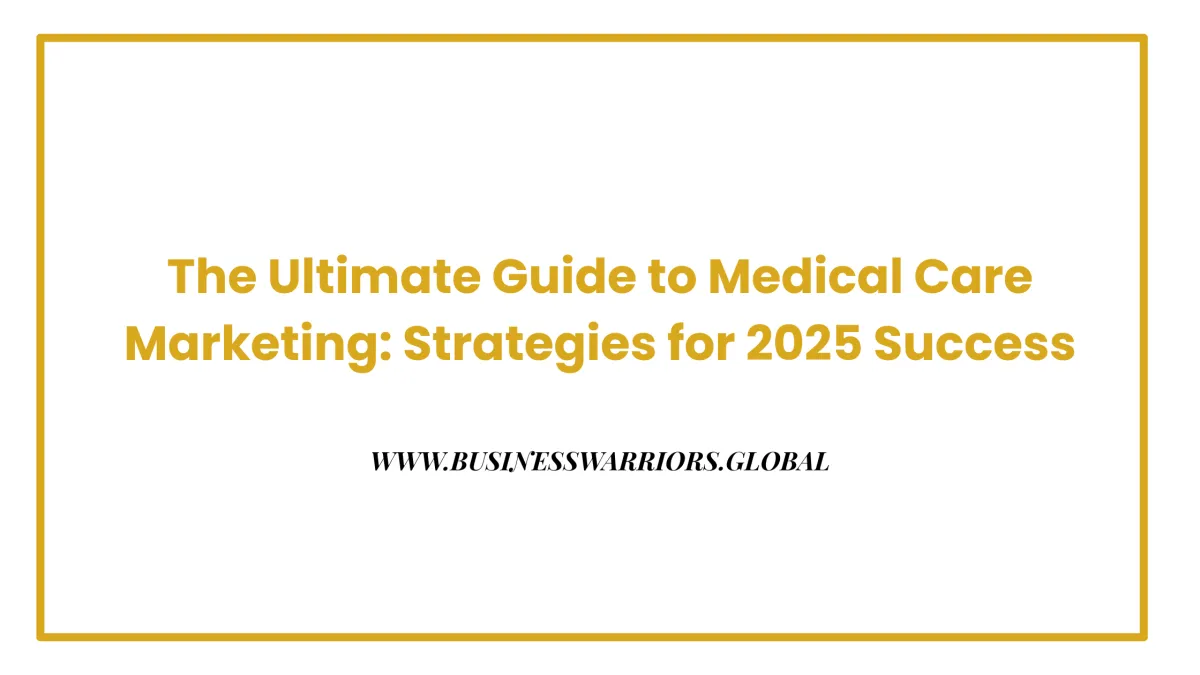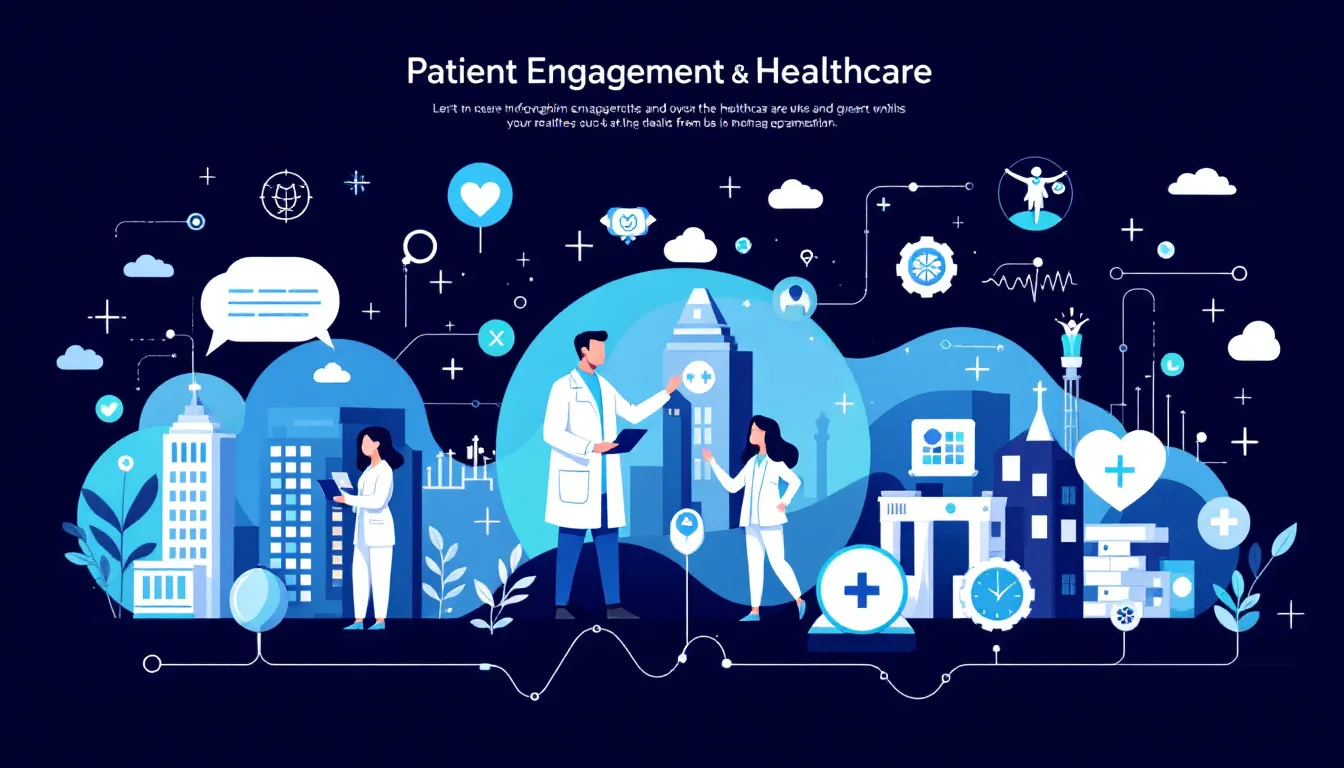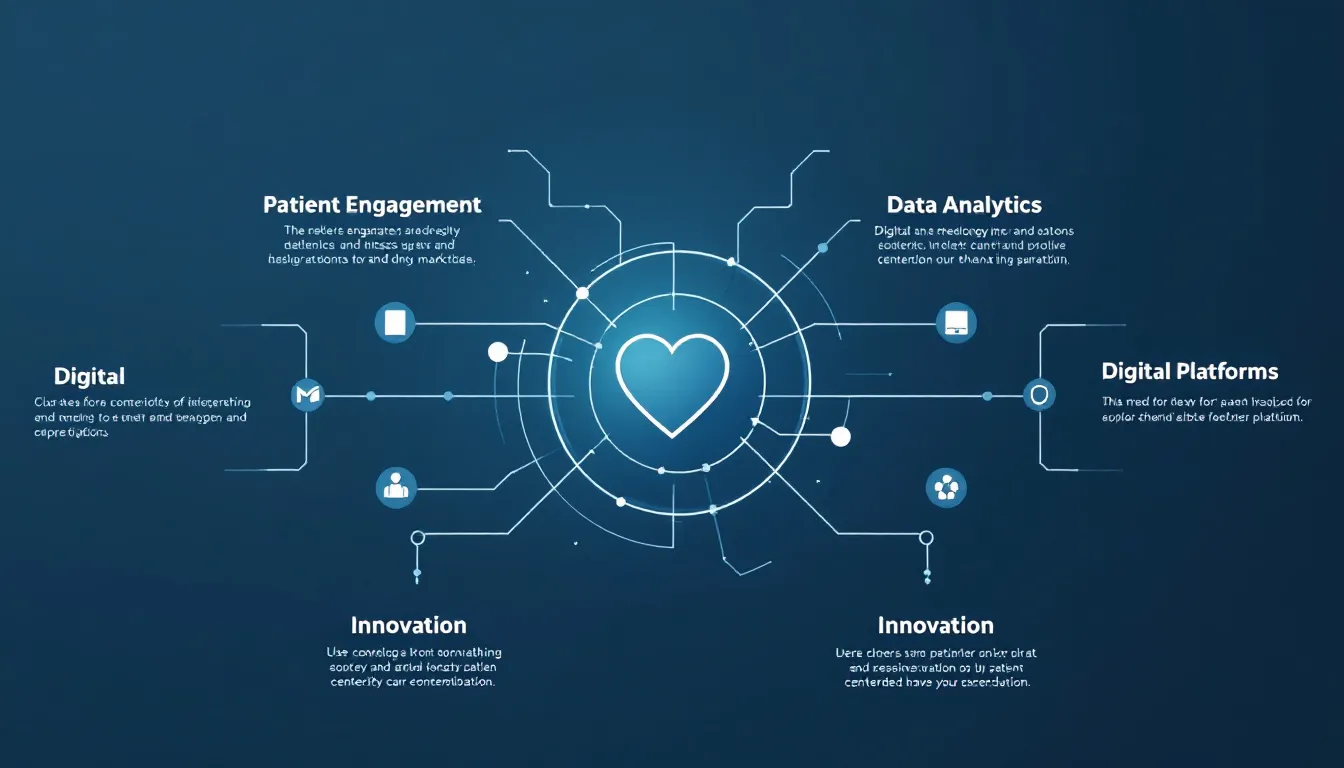
The Ultimate Guide to Medical Care Marketing: Strategies for 2025 Success
Medical care marketing is essential for attracting and retaining patients in today’s competitive healthcare landscape. It involves various strategies to engage patients, build trust, and promote your services effectively. This guide outlines actionable methods to enhance your marketing efforts, leverage digital tools, and personalize patient interactions to boost your practice’s growth.
Key Takeaways
Effective healthcare marketing combines online and offline strategies to build trust and engage with a diverse patient demographic.
Conducting thorough market analysis, including SWOT analysis and competitor identification, is essential for developing targeted healthcare marketing strategies.
Setting measurable SMART goals and utilizing key performance indicators (KPIs) are crucial for evaluating the success of healthcare marketing campaigns and optimizing future efforts.
Understanding Medical Care Marketing

Healthcare marketing involves strategies that differentiate and engage healthcare providers with patients, emphasizing the unique aspects of healthcare services. This healthcare marketing strategy is crucial for building trust between providers and patients, which facilitates better patient-provider interactions and enhances the overall healthcare experience.
Sophisticated healthcare marketing integrates both online and offline methods to connect with diverse patient demographics. With 73% of Google searches being health-related, the trend towards digital engagement is undeniable. An effective healthcare marketing strategy is not just about promoting services but also about creating a strong brand identity and fostering long-term relationships with patients.
Importance of Medical Care Marketing
Changing consumer behavior, convenience, and the need for personalized care are driving the importance of healthcare marketing important for healthcare consumers. Patients prioritize convenience and personalized care when selecting healthcare providers, making it essential for providers to differentiate themselves through effective marketing strategies.
Moreover, healthcare marketing helps providers stand out, retain patients, gain new ones, and keep them informed. Providing reliable medical information during challenging times, such as a pandemic, can help healthcare organizations build trust and credibility in the healthcare industry.
Digital marketing, being more scalable, measurable, and cost-effective, further underscores the importance of healthcare marketing in today’s world.
Conducting Market Analysis for Medical Care Marketing

Conducting a thorough market analysis is essential for gaining insights into the healthcare market landscape. Analyzing market dynamics helps healthcare providers understand competition and consumer needs amid industry changes. This systematic examination of trends and dynamics helps providers stay relevant in an evolving market.
AI-powered conversation intelligence software can assist healthcare providers by providing insights into patient interactions and data on ad effectiveness. Additionally, dialogue between marketing and upper management helps marketers understand organizational goals, ensuring that marketing strategies align with broader business objectives.
A SWOT analysis helps healthcare providers understand their market position and identify strategic opportunities. Evaluating competitors’ marketing strategies is crucial for benchmarking efforts and improving your own marketing strategies.
This analysis enables providers to leverage their strengths, address weaknesses, capitalize on opportunities, and mitigate threats.
Identifying Competitors in Healthcare Marketing
Competitor identification involves assessing both direct and indirect competition in the healthcare space. Understanding competitors allows healthcare providers to refine their marketing strategies based on market gaps and strengths.
Utilizing insights from competitor analysis can lead to enhanced patient engagement and better allocation of marketing resources, providing a competitive advantage.
Defining Your Target Audience in Healthcare Marketing Strategy
Defining your target audience is crucial for better understanding and serving existing and potential patients. Target marketing in healthcare involves segmenting the audience, selecting specific groups to focus on, and positioning services to meet their unique needs. An Ideal Customer Profile (ICP) in healthcare marketing is a detailed description of the target audience, guiding positioning and marketing decisions.
The purpose of creating an ICP is to analyze the patient base and services effectively, helping to identify growth opportunities. A growing trend in patient services is the increasing adoption of telehealth and remote services, which impacts how target audiences are defined. An in-depth examination of patient needs is essential for the healthcare marketing process.
Creating Patient Personas
Patient personas are a semi-fictional representation of ideal patients based on clinical data analysis. These personas are developed by analyzing demographic data and behavioral patterns to create a detailed representation of ideal patients, existing patients, and past patients.
Using patient personas allows healthcare providers to tailor their marketing strategies effectively, increasing engagement and conversion rates.
Monitoring Patient Preferences In Your Digital Marketing Strategy
Understanding and adapting to patient preferences can lead to improved satisfaction, resulting in positive word-of-mouth and increased referrals. Recent trends indicate a growing preference for home healthcare services and telemedicine subscriptions. An Ideal Customer Profile (ICP) should be flexible enough to adapt to changing patient needs and healthcare trends.
Patient feedback can be collected through surveys and online reviews. 48% of patients rely on word-of-mouth recommendations when making healthcare decisions. Understanding these preferences helps healthcare providers align their marketing strategies with the patient journey and needs, leading to better patient engagement and satisfaction.
Setting Measurable Goals in Medical Care Marketing

Clear goals enhance clarity in marketing strategies and facilitate performance evaluation. Digital marketing allows healthcare organizations to track and evaluate the effectiveness of their campaigns extensively. Successful healthcare marketing strategies evolve based on data and patient feedback, ensuring continuous improvement.
Setting measurable goals helps healthcare marketers focus their efforts and resources effectively. These goals should be specific, measurable, achievable, relevant, and time-bound (SMART) to increase the likelihood of achieving healthcare marketing objectives.
Effective Healthcare Marketing That Utilize Key Performance Indicators (KPIs)
Objectives in healthcare marketing campaigns should be specific and trackable. KPIs should be tailored to reflect specific objectives within healthcare marketing campaigns. Healthcare marketers should focus on specific conversion metrics, such as the rate of appointment bookings.
Basic marketing KPIs to analyze include open rates for emails and click-through rates for ads. Additionally, conversion rates are also important to consider. Analyzing these KPIs helps in measuring marketing effectiveness and guiding data-driven decisions.
Establishing SMART Goals As Healthcare Marketers
SMART stands for:
Specific
Measurable
Achievable
Relevant
Time-bound in the context of healthcare marketing goals. Implementing SMART criteria can increase the likelihood of achieving healthcare marketing objectives.
These goals provide a clear framework for healthcare marketers to plan and execute their marketing initiatives effectively.
Building a Strong Brand Identity in Healthcare

A strong brand identity is essential for differentiation in a competitive market and reflects organizational values. Developing consistent branding is the first step in marketing efforts for healthcare providers. High-quality care, caring staff, technology, and trust are critical factors that attract patients.
Components of a strong brand identity include a distinctive representation of values, mission, and personality. Promoting quality achievements is an effective way to build a trusting brand image in healthcare. Branding is important for healthcare providers as it helps gain new patients and retain old ones.
Consistent Branding Across Multiple Channels
Brand consistency can be cultivated by ensuring a similar visual and messaging approach across all advertising and communication platforms. Establishing brand messaging guidelines helps align the communication style with the values and mission of the healthcare organization. Consistent branding across various digital platforms enhances recognition and trust among patients, making it easier for them to connect with the healthcare provider.
Overall, consistent branding can significantly impact patient trust and help healthcare organizations establish a solid reputation in the community. This consistency should be maintained across all digital platforms, including social media, websites, and email campaigns, to create a seamless patient experience.
Developing Brand Messaging Guidelines
The purpose of developing brand guidelines in healthcare marketing is to ensure a consistent tone and language across all communications. These guidelines are crucial for maintaining a unified communication strategy, which helps build trust and recognition among patients.
Ultimately, well-defined brand messaging enhances the overall patient experience and perception of the healthcare provider.
Crafting a Multichannel Marketing Plan
A multichannel marketing campaign is a strategic approach that uses various channels to engage a target audience. Healthcare marketing plays a vital role in creating connections between healthcare providers and patients, ultimately enhancing patient care and driving organizational growth. A comprehensive multichannel marketing team utilizes various platforms to effectively engage a target audience.
The role of a CRM platform in healthcare marketing is to integrate patient data for multichannel campaigns, personalize outreach, and improve patient engagement. Common types of content used by healthcare companies include research publications, articles, educational videos, newsletters, and infographics.
Examples of healthcare marketing ideas include blog posts, educational videos, targeted emails, and gamification.
Search Engine Optimization (SEO) for Healthcare Providers
Medical SEO increases online visibility and attracts patients through search engines. For a healthcare website to rank high on Google, it requires full optimization, unique content, and strategic use of relevant keywords. Independent agencies or in-house marketing staff with relevant skills can help improve SEO for healthcare marketing. Benefits like optimized site speeds and responsive design improve search engine visibility.
Used online channels for medical marketing include:
PPC advertising
SEO
Social media
Email newsletters
Various marketing techniques
These channels help healthcare providers reach a wider audience and attract more patients by improving their online presence through social media posts.
Pay-Per-Click (PPC) Advertising in Healthcare
Pay-Per-Click (PPC) advertising is an effective marketing strategy in healthcare advertising that drives targeted traffic to medical practices. Key features of PPC advertising include:
Costs are incurred only when users click on the ads, making it budget-friendly.
Ads can be targeted by location and keywords.
This targeting helps effectively reach local users.
Software like Invoca can be used to track appointments generated from PPC ads, improving the efficiency of patient acquisition. This helps healthcare providers optimize their PPC campaigns and allocate their marketing budget more effectively.
Email Marketing Strategies for Healthcare
Email marketing can effectively provide patients with valuable information and updates, enhancing engagement. Key aspects include:
Personalized email content keeps patients informed and engaged, leading to better patient relationships.
The messaging should be consistent with the website and any digital ads.
Well-executed email marketing can enhance patient loyalty and satisfaction.
By sending regular updates, healthcare providers can keep patients engaged and informed about new services, health tips, and important announcements. This not only improves patient satisfaction but also helps build a long-term relationship with them.
Creating and Managing a Content Marketing Calendar
A content calendar assists in the strategic planning of content creation and distribution. Only 28% of healthcare marketers have a clearly defined content marketing strategy. A content calendar helps create relevant, timely content that addresses patient questions. An imbalance in content types can lead to too much top-of-funnel content and not enough middle-funnel content.
Medical content marketing assets should align with audience personas and consumption preferences. Incorporating timely health observances into a content calendar enhances engagement and connects with audiences.
Blogging is crucial in healthcare content marketing as it educates and helps the audience. A content calendar helps with marketing campaigns by preventing repetition and focusing on relevant topics.
Effective Content Distribution Channels
Choosing the right distribution channels is crucial for effectively reaching and interacting with the target audience. Regularly updating website content is vital for maintaining good SEO practices and ranking well in search results. Hiring an SEO agency can help you to do this
Effective content distribution channels include:
Social media platforms
Email newsletters
Blogs
Video marketing
By utilizing these channels, healthcare providers can ensure that their content reaches the right audience and keeps them engaged.
Innovative Healthcare Marketing Ideas
Creative marketing ideas can include:
Interactive tools that engage patients and enhance their experience.
Quick-read emails on specific topics.
Educational content in newsletters that effectively engage patients.
Content must be informative and engaging to maximize the effectiveness of email marketing.
The focus of healthcare video content should be on providing credible, accurate, and helpful information for healthcare professionals. Curating content from medical industry experts builds credibility and highlights new research or trends.
Ensuring Regulatory Compliance in Healthcare Marketing
Adherence to legal and ethical standards is essential for ensuring the protection of patient information and maintaining marketing integrity. Marketing for healthcare is considered difficult due to various regulations, ethical issues, and the necessity to comply with HIPAA. Healthcare CRM systems assist in compliance by helping to maintain HIPAA standards.
Healthcare marketing strategies must prioritize the safeguarding of patient health information as mandated by HIPAA. Effective marketing strategies in healthcare must adhere to HIPAA compliance to protect patient information and maintain legal standards.
HIPAA Compliance in Marketing Efforts
Medical marketers must ensure compliance with regulations and ethical guidelines to foster trust in healthcare marketing efforts. Healthcare marketing strategies must be HIPAA compliant to protect patient information and maintain legal standards. Effective marketing strategies in healthcare must prioritize the safeguarding of patient health information as mandated by HIPAA.
There are typically no HIPAA concerns with remarketing in healthcare marketing unless it blurs the line regarding the use of patient data. Landing page forms for remarketing should include only basic contact information like name and email to comply with HIPAA.
Understanding Healthcare Marketing Regulations
Healthcare marketing regulations encompass legal guidelines and standards for marketing practices in healthcare. Legal healthcare regulations that must be adhered to in healthcare marketing include HIPAA, GDPR, and the CAN-SPAM Act.
All healthcare organizations and covered entities are required to comply with HIPAA regulations.
Measuring Marketing Performance in Healthcare
Measuring marketing performance in healthcare is crucial for validating strategies and optimizing future marketing efforts. Key aspects include:
Consistent monitoring of marketing results to lead to more effective healthcare marketing.
Utilizing a CRM system to enhance customer service.
Using CRM to help foster long-term relationships within marketing strategies.
Success in healthcare marketing can be assessed using specific metrics. These metrics should align with key performance indicators (KPIs) and marketing return on investment (ROI). Common KPIs in healthcare marketing include click-through rates, conversions, and the number of new patients acquired.
Analyzing Key Performance Indicators (KPIs)
Tracking and analyzing KPIs allows healthcare marketers to measure the effectiveness of their strategies and make informed adjustments. Measuring the effectiveness of marketing efforts through KPIs helps determine what strategies are successful and which need improvement.
The analysis of KPIs provides invaluable insights that can lead to improved marketing strategies and greater return on investment.
Collecting Patient Feedback and Reviews
Engaging with patients through feedback mechanisms enhances the credibility of health systems. The importance of patient feedback in healthcare marketing includes:
Collecting patient feedback to understand patient needs and preferences.
Analyzing patient feedback to refine marketing strategies effectively.
Incorporating patient insights to improve patient satisfaction and loyalty.
Patient reviews significantly influence new patients’ selection of healthcare providers, enhancing brand visibility and credibility. Understanding patient needs leads to higher satisfaction, positive reviews, and an increase in referrals, resulting in satisfied patients. Additionally, patient testimonials play a crucial role in building trust.
Best Practices for Successful Healthcare Marketing

A strong brand identity can significantly enhance patient loyalty and trust in healthcare settings. Main barriers to successful healthcare marketing include departmental silos, outdated tactics, and insufficient budgets. Healthcare organizations can leverage consumer and market data, create individualized messaging, and use omnichannel marketing to maximize their marketing impact.
Utilizing various forms of content, such as blogs and newsletters, can attract and retain patients through valuable information. Engagement Centers provide personalized, timely, and relevant content, improving patient acquisition and retention.
Using technology platforms in marketing helps healthcare providers track performance and optimize strategies effectively within the healthcare systems health system.
Integrating Telehealth Services
Telehealth services have surged in popularity, providing a convenient option for patients seeking healthcare services remotely. Telehealth is increasingly favored by patients due to its convenience and accessibility.
Healthcare providers should integrate telehealth into their marketing strategies to meet patient demand and provide a modern, convenient healthcare practice option. Many healthcare providers can use this integration to attract new patients and improve patient satisfaction.
Leveraging Healthcare CRM Systems
Healthcare Customer Relationship Management (CRM) systems enhance patient engagement by centralizing patient data and enabling personalized communication. The purpose of healthcare CRM systems is to manage and analyze interactions with patients and prospects. Utilizing CRM systems can lead to improved patient engagement through targeted communication.
Personalization in healthcare communication is significant as it fosters stronger relationships between patients and providers. By leveraging CRM systems, healthcare providers can improve patient satisfaction and loyalty.
Summary
In summary, effective healthcare marketing is essential for building trust, engaging patients, and driving organizational growth. By understanding and implementing strategies such as market analysis, defining target audiences, setting measurable goals, and ensuring regulatory compliance, healthcare providers can enhance their marketing efforts and achieve success.
As the healthcare landscape continues to evolve, staying up-to-date with the latest marketing trends and best practices is crucial. By leveraging modern marketing techniques and tools, healthcare organizations can create strong brand identities, improve patient satisfaction, and ultimately thrive in a competitive market.
Contact Business Warriors Digital Marketing Agency For A FREE Marketing Plan Today
Frequently Asked Questions
Why is healthcare marketing important?
Healthcare marketing is essential as it enables providers to differentiate themselves, attract and retain patients, and foster trust, ultimately enhancing patient-provider relationships. Prioritizing effective marketing strategies can lead to better patient engagement and overall satisfaction.
What are some key components of a strong brand identity in healthcare?
A strong brand identity in healthcare is defined by a clear representation of your values, mission, and personality, alongside high-quality care, compassionate staff, advanced technology, and a foundation of trust. Prioritizing these elements will establish a trustworthy and memorable brand.
How can healthcare providers ensure HIPAA compliance in their marketing efforts?
Healthcare providers must prioritize safeguarding patient health information and adhere to HIPAA regulations by using compliant technologies, such as HIPAA-certified CRM systems, in their marketing efforts. This commitment ensures both legal compliance and the protection of patient privacy.
What are some effective KPIs for measuring healthcare marketing performance?
To effectively measure healthcare marketing performance, focus on key KPIs such as click-through rates, conversions, new patient acquisition, email open rates, and conversion rates. These metrics will provide valuable insights into your marketing effectiveness.
How can healthcare providers leverage telehealth services in their marketing strategies?
Healthcare providers should integrate telehealth options into their services and emphasize their convenience and accessibility in marketing efforts. Promoting the specific benefits of telehealth will effectively attract new patients.




